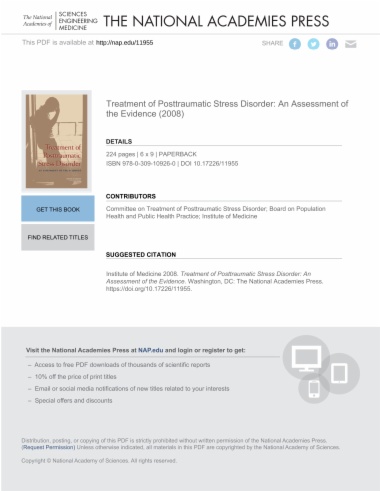

Mental disorders, including posttraumatic stress disorder (PTSD), constitute an important health care need of veterans, especially those recently separated from service. Treatment of Posttraumatic Stress Disorder: An Assessment of the Evidence takes a systematic look the efficacy of pharmacologic and psychological treatment modalities for PTSD on behalf of the Department of Veterans Affairs. By reviewing existing studies in order to draw conclusions about the strength of evidence on several types of treatment, the Committee on the Treatment of Posttraumatic Stress Disorder found that many of these studies were faulty in design and performance, and that relatively few of these studies have been conducted in populations of veterans, despite suggestions that civilian and veteran populations respond differently to various types of treatment. The committee also notes that the evidence is scarce on the acceptability, efficacy, or generalizability of treatment in ethnic and cultural minorities, as few studies stratified results by ethnic background.
Despite challenges in the consistency, quality, and depth of research, the committee found the evidence sufficient to conclude the efficacy of exposure therapies in treating PTSD. The committee found the evidence inadequate to determine efficacy of different types of pharmacotherapies, of three different psychotherapy modalities, and of psychotherapy delivered in group formats. The committee also made eight critical recommendations, some in response to the VA's questions related to recovery and the length and timing of PTSD treatment, and others addressing research methodology, gaps in evidence and funding issues.